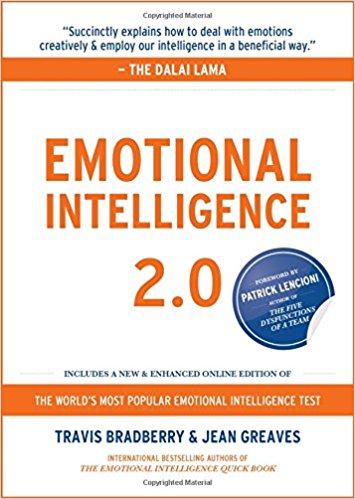Emotional Intelligence 2.0 Summary
4 min read ⌚
 The World’s Most Popular Emotional Intelligence Test
The World’s Most Popular Emotional Intelligence Test
By now, you’re more than aware that there are many types of intelligence. And that the standard intelligence quotient (IQ) is not enough to measure most of your capacities.
In other words, you don’t Travis Bradberry and Jean Greaves to tell you that one of them is certainly your emotional intelligence. However, if you do want to increase it – then “Emotional Intelligence 2.0” is the way to go!
About Travis Bradberry and Jean Greaves
Travis Bradberry is an award-winning co-author of few books translated in almost 30 languages and available in more than 150 countries. He is the co-founder of “TalentSmart®,” world’s #1 provider of emotional intelligence.
is an award-winning co-author of few books translated in almost 30 languages and available in more than 150 countries. He is the co-founder of “TalentSmart®,” world’s #1 provider of emotional intelligence.
 Jean Greaves is the other founder of “TalentSmart®” and its current CEO. She has co-authored all of her books with Bradberry, including “Emotional Intelligence 2.0” and “The Emotional Intelligence Quick Book.”
Jean Greaves is the other founder of “TalentSmart®” and its current CEO. She has co-authored all of her books with Bradberry, including “Emotional Intelligence 2.0” and “The Emotional Intelligence Quick Book.”
“Emotional Intelligence 2.0 Summary”
Many years ago, Daniel Goleman refined the meaning of being smart by introducing the concept of emotional intelligence.
And, nowadays, few people would ever think of questioning its importance and value in real-life situations.
However, as Travis Bradberry and Jean Greaves claim in “Emotional Intelligence 2.0,” knowing what EI – or EQ or even EIQ is – doesn’t make you smart; just like knowing what IQ is very much different from sharing similar IQ score with Stephen Hawking.
And – to further develop the analogy – if you want to increase your IQ, you’ll have to read some books. But, how do you increase your EQ?
Well, that’s what this book is all about from start to finish! As Stephen R. Covey says, it “gives abundant, practical findings and insights with emphasis on how to develop EQ.”
In four different areas!
First of all, self-awareness. Or the ability to understand your own self. Obviously, the solution is simple: know thyself. And how? By tracking down what you do when you’re feeling good, and what you do when you’re feeling bad. And understanding that these are both part of your being – and that you can control them.
Which brings us to the second element of EI: self-management. And self-management is all about balancing your logical and emotional side. A good place to start is your notebook! Making two-columned lists comparing the emotional and the logical benefits of a decision will prevent either side from dominating your actions and decisions.
The third aspect of EI is social awareness. Because, after all, we’re not alone on this planet. And because there are many things we like about it others may not – and vice versa. So, everybody has to adapt. The best way to do this is via the name-remembering body-study method. Be nice to people – in the way their bodies tell you to be.
Finally, relationship management is all about how to reverse this. Namely, how to make sure that your body language is saying the same as the actual words you want to say. Of course, this is based on accepting feedbacks and constructive criticism – because otherwise, it’s very hard to see yourself as well as those around you can.
Key Lessons from “Emotional Intelligence 2.0”
1. Self-Awareness: Know Thyself
2. Self-Management: Balance Your Emotional and Rational Self
3. Social Awareness: Be Aware of the Other People
4. Relationship Management: Criticism Isn’t Bad at All
Self-Awareness: Know Thyself
Emotional intelligence is based on four core foundations. The first one among them is self-awareness. Namely, if you want to be better in your emotional communication with the people around you, you must first be fully aware of both your good and your bad sides.
Self-Management: Balance Your Emotional and Rational Self
Self-management means finding a way to manage your behavior. More often than not, we’re too rational when we need to be emotional and vice versa. Make emotion vs. logic tables each time you’re faced with a serious decision. It’ll make things much easier.
Social Awareness: Be Aware of the Other People
Because you can’t live in isolation, you must learn how to live in a community. And in order to do that, you must first become aware of what other people like or dislike. Or, in other words, you must study their body language closely – and react accordingly. Remembering and repeating names is always a good strategy.
Relationship Management: Criticism Isn’t Bad at All
Finally, relationship management. This is the recto of the relationship coin whose verso is social awareness. Or, in other words, you need to please people, but, in order to do that, you need to learn more about the type of energy you emit yourself. So, ask around. Analyze the feedback. And adapt!
Like this summary? We’d like to invite you to download our free 12 min app, for more amazing summaries and audiobooks.
“Emotional Intelligence 2.0” Quotes
Emotional intelligence is your ability to recognize and understand emotions in yourself and others, and your ability to use this awareness to manage your behavior and relationships. Share on X Anyone can become angry—that is easy. But to be angry with the right person, to the right degree, at the right time, for the right purpose, and in the right way, this is not easy. Share on X The biggest obstacle to increasing your self-awareness is the tendency to avoid the discomfort that comes from seeing yourself as you really are. Share on X Remember, feedback is meant to address the problem, not the person. Share on X You do control the thoughts that follow an emotion, and you have a great deal of say in how you react to an emotion—as long as you are aware of it. Share on X
Emir is the Head of Marketing at 12min. In his spare time, he loves to meditate and play soccer.


 The World’s Most Popular Emotional Intelligence Test
The World’s Most Popular Emotional Intelligence Test



